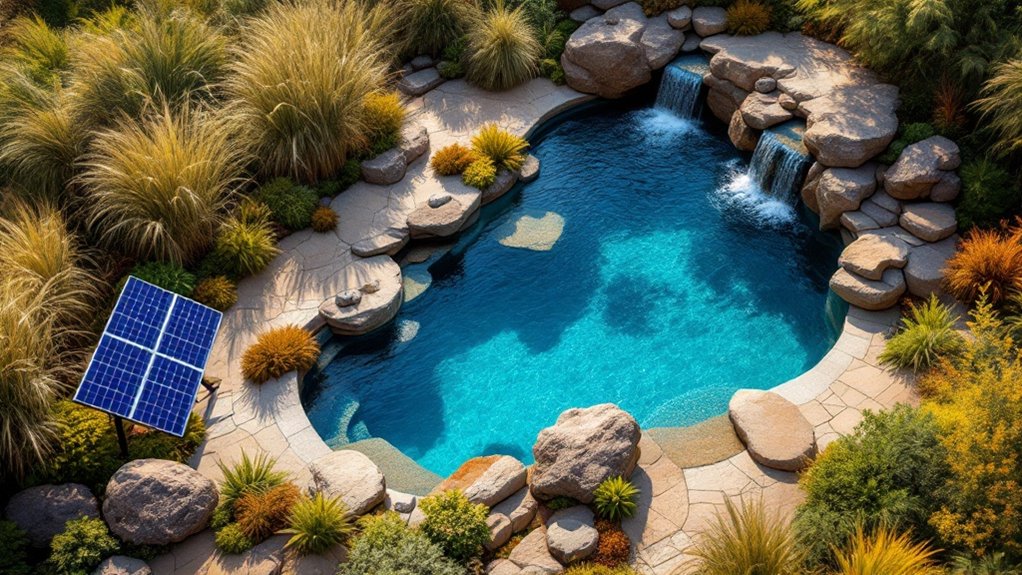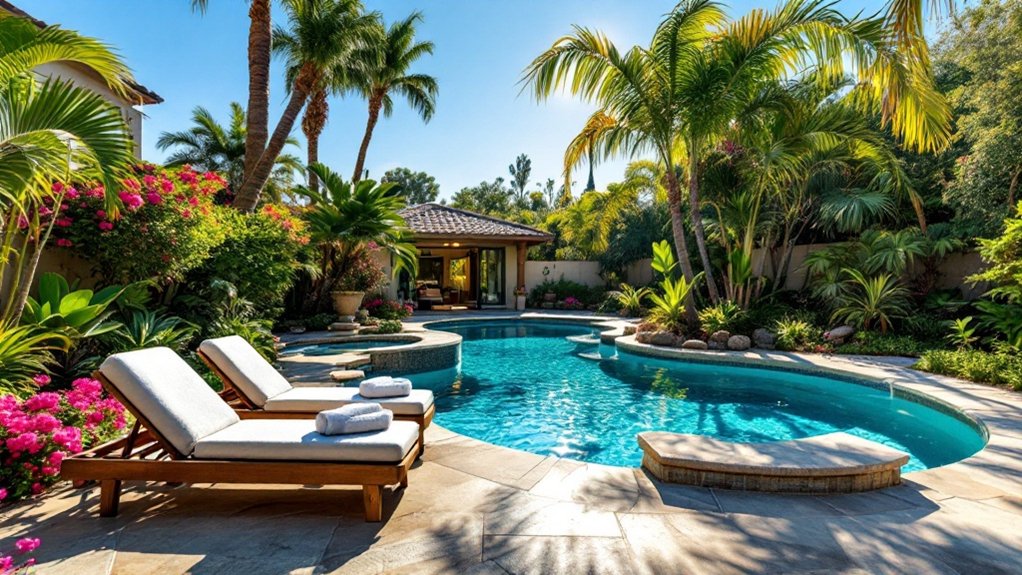Sustainable swimming pool design represents a thoughtful approach to creating eco-friendly outdoor spaces. By selecting natural materials and integrating energy-efficient systems, homeowners can enhance both the beauty and functionality of their pools. Additionally, incorporating native plants and utilizing innovative filtration methods can greatly reduce environmental impact. As the demand for sustainable living grows, exploring these design ideas reveals not only aesthetic value but also a commitment to a more responsible lifestyle. What options might best suit your vision?
Choosing Natural Materials for Your Pool Design
In the domain of sustainable swimming pool design, the choice of materials plays an essential role in both aesthetics and environmental impact. Natural materials, such as stone, wood, and clay, offer an eco-friendly alternative to synthetic options. Stone provides durability and a timeless look, while sustainably sourced wood can create a warm, inviting atmosphere. Clay tiles, often used for pool surfaces, blend beauty with lower environmental footprints. These materials not only enhance the visual appeal of the pool area but also reduce reliance on harmful chemicals and non-renewable resources. Additionally, incorporating native plants around the pool can create a harmonious landscape, further promoting biodiversity. Ultimately, selecting natural materials contributes to a sustainable swimming pool that respects both the environment and design principles.
Incorporating Solar Heating Systems
Natural materials not only enhance the aesthetic appeal of a swimming pool but also set the stage for integrating eco-friendly technologies. One significant addition is a solar heating system, which captures sunlight to maintain ideal water temperatures. By installing solar panels on rooftops or poolside, homeowners can utilize renewable energy, reducing reliance on conventional heating methods. This system operates with minimal maintenance, making it an efficient choice for sustainable pool design. Additionally, solar heating can extend the swimming season, providing comfort without increasing energy costs. Incorporating these systems not only promotes environmental responsibility but also aligns with the overall ethos of eco-friendly living, ultimately enhancing the enjoyment of the pool while minimizing its ecological footprint. Furthermore, considering local permits and regulations is essential when integrating solar heating to ensure compliance and optimal performance.
Utilizing Rainwater Harvesting Techniques
Rainwater harvesting techniques can greatly enhance sustainable swimming pool design by integrating efficient rainwater collection systems. These systems capture and store rainwater, which can then be filtered and used to refill pools, reducing reliance on municipal water sources. Implementing effective water filtration solutions guarantees that this harvested water meets quality standards for pool use.
Rainwater Collection Systems
Effective rainwater collection systems play an essential role in sustainable swimming pool design by harnessing the natural precipitation that falls on a property. These systems typically involve capturing rainwater from roofs and directing it into storage tanks or cisterns. By utilizing gutters and downspouts, homeowners can efficiently channel rainwater, reducing runoff and erosion while conserving municipal water resources. The collected rainwater can be utilized to refill swimming pools, maintaining water levels without relying solely on treated water sources. Additionally, integrating filtration systems guarantees that the rainwater remains clean and safe for pool use. Overall, implementing rainwater collection systems not only promotes environmental sustainability but also offers significant long-term cost savings for eco-conscious homeowners.
Water Filtration Solutions
Harnessing collected rainwater for swimming pool use necessitates robust water filtration solutions to guarantee safety and quality. Effective filtration systems are vital in removing impurities, debris, and pathogens from the harvested rainwater, making certain it meets health standards. Advanced technologies such as multi-stage filtration, UV purification, and ozone treatment are commonly employed to enhance water clarity and reduce chemical reliance. Additionally, integrating eco-friendly filters, like sand or diatomaceous earth, can further promote sustainability. Regular maintenance of these filtration systems is essential to guarantee peak performance and longevity. By investing in extensive filtration solutions, homeowners can not only enjoy a pristine swimming experience but also contribute to environmental conservation through responsible water management.
Implementing Natural Filtration Systems
Natural filtration systems offer an eco-friendly alternative to traditional pool maintenance methods, providing both environmental benefits and improved water quality. Various types of systems, such as biofilters and constructed wetlands, can be employed to enhance the filtration process. Proper maintenance and care tips are essential for ensuring the longevity and effectiveness of these sustainable solutions.
Benefits of Natural Filtration
While many homeowners seek environmentally friendly alternatives for their swimming pools, implementing natural filtration systems offers numerous benefits that extend beyond aesthetics. These systems utilize natural processes, such as plants and microorganisms, to maintain water clarity and quality, reducing the reliance on harsh chemicals. Consequently, this approach promotes a healthier swimming environment, free from allergens and irritants. Additionally, natural filtration systems often lead to lower maintenance costs over time, as they require less frequent chemical balancing and filtration system replacements. Moreover, integrating these systems can enhance the overall landscape aesthetics, creating a serene and inviting atmosphere. Ultimately, natural filtration systems contribute to sustainable practices, aligning with the values of eco-conscious homeowners while ensuring a clean and enjoyable swimming experience.
Types of Filtration Systems
Filtration systems play an essential role in maintaining the cleanliness and safety of swimming pools, with various types available to suit different environmental philosophies and designs. Among these, natural filtration systems have gained popularity for their eco-friendly approach. Utilizing plants, gravel, and sand, these systems create a self-sustaining ecosystem that effectively cleans water without harsh chemicals. Bio-filtration, a variant, incorporates beneficial bacteria to break down organic matter, ensuring crystal-clear water. Other options include traditional sand and cartridge filters, which mechanically remove debris but may require chemical aids. Choosing the right filtration system depends on the pool’s usage, size, and the owner’s commitment to sustainability, ultimately contributing to a healthier swimming environment.
Maintenance and Care Tips
Effective maintenance and care are essential for guaranteeing the longevity and efficiency of natural filtration systems in swimming pools. Regular monitoring of water quality is vital; pH levels and clarity should be tested frequently to prevent algae growth and maintain a healthy swimming environment. Additionally, periodic cleaning of the filtration media, such as gravel or sand, helps maintain peak flow rates. The surrounding plant life must also be tended to, as overgrowth can impact filtration performance. It is advisable to remove debris and organic matter that may accumulate in the pool. Finally, seasonal assessments of the system will allow for timely repairs or adjustments, guaranteeing that the natural filtration system remains effective and sustainable over time.
Designing Pools With Energy-Efficient Lighting
As homeowners increasingly prioritize sustainability in their pool designs, incorporating energy-efficient lighting becomes essential for both aesthetic appeal and environmental responsibility. LED lights, known for their longevity and low energy consumption, serve as an excellent choice for illuminating pool areas. These lights not only reduce electricity bills but also minimize the carbon footprint associated with traditional lighting options. Additionally, smart lighting systems can be programmed to adjust brightness based on natural light levels, further enhancing energy efficiency. Incorporating solar-powered lights around the pool enhances sustainability while creating a serene ambiance. By strategically placing these lighting solutions, homeowners can highlight design features while promoting eco-friendly practices, ensuring that their pools remain inviting and environmentally conscious spaces. Regular exhaust fan cleaning also contributes to improved air quality in pool areas, making them safer and more enjoyable for swimmers.
Creating a Native Plant Landscape Around Your Pool
While homeowners seek to create a harmonious outdoor environment, integrating a native plant landscape around the pool can considerably enhance both aesthetics and ecological health. Native plants are adapted to local climates and require less water and maintenance, making them ideal for sustainable landscaping. They support local wildlife, including pollinators and beneficial insects, fostering biodiversity. By selecting plants that thrive in the area, homeowners reduce the need for chemical fertilizers and pesticides, promoting a healthier ecosystem. Additionally, a well-planned native landscape can provide natural shade, reducing water evaporation from the pool and minimizing heating costs. This thoughtful approach not only beautifies the pool area but also aligns with eco-friendly principles, contributing to a more sustainable home environment.
Exploring Eco-Friendly Pool Covers
When considering sustainable swimming pool options, exploring eco-friendly pool covers becomes essential for energy efficiency and water conservation. These covers, often made from recycled materials, serve to maintain water temperature, thereby reducing the need for heating. By minimizing evaporation, they greatly conserve water, making them a crucial component of sustainable pool design.
Furthermore, eco-friendly pool covers can also help keep debris out, reducing the frequency of cleaning and chemical usage. Some options even reflect UV rays, protecting pool surfaces and extending the life of the pool’s materials. Overall, selecting an eco-friendly pool cover not only contributes to sustainability efforts but also enhances the usability and longevity of the swimming pool, aligning with eco-conscious lifestyles.
Opting for Sustainable Pool Accessories and Equipment
Choosing sustainable pool accessories and equipment can greatly enhance the overall environmental impact of a swimming pool. Opting for solar-powered pool lights and energy-efficient pumps minimizes energy consumption while providing necessary functions. Biodegradable pool chemicals, such as natural algaecides and sanitizers, promote a healthier ecosystem and reduce chemical runoff. Additionally, using recycled materials for poolside furniture and accessories not only supports sustainability but also adds unique aesthetic appeal. Incorporating water-saving features like automatic refill systems and low-flow pool showers can considerably reduce water usage. Finally, choosing durable, long-lasting products minimizes waste over time, aligning with sustainable principles. By making informed choices in accessories and equipment, pool owners can contribute to a more eco-friendly swimming experience.
Frequently Asked Questions
How Can I Reduce Pool Maintenance Costs Sustainably?
To reduce pool maintenance costs sustainably, one might consider utilizing energy-efficient pumps, installing automated cleaning systems, employing natural filtration methods, and using eco-friendly chemicals. These strategies can effectively lower expenses while promoting environmental responsibility.
What Are the Environmental Impacts of Traditional Pool Chemicals?
The environmental impacts of traditional pool chemicals include water contamination, harm to aquatic life, and potential harm to human health. These chemicals can disrupt ecosystems, contribute to pollution, and necessitate additional treatment processes for safe disposal.
Can I Use Recycled Materials in My Pool Design?
The use of recycled materials in pool design is increasingly popular. Designers often incorporate reclaimed wood, recycled glass, and repurposed stones, promoting sustainability while enhancing aesthetics, thereby contributing to environmentally-friendly construction practices and reducing waste.
How Do I Choose Eco-Friendly Pool Furniture?
Choosing eco-friendly pool furniture involves selecting items made from sustainable materials, such as reclaimed wood or recycled plastics. Additionally, considering durability and weather resistance guarantees longevity, reducing the need for frequent replacements and environmental impact.
What Are the Long-Term Benefits of Sustainable Pool Design?
The long-term benefits of sustainable pool design include reduced environmental impact, lower maintenance costs, enhanced property value, improved water efficiency, and promotion of healthier lifestyles, contributing positively to both individual well-being and community sustainability efforts.
Conclusion
Incorporating sustainable swimming pool design ideas not only enhances the aesthetic appeal of eco-friendly homes but also promotes environmental stewardship. By choosing natural materials, utilizing solar heating and rainwater harvesting, and implementing natural filtration systems, homeowners can create beautiful, functional spaces that align with their eco-conscious values. Additionally, integrating native plants and energy-efficient lighting further reduces environmental impact. Ultimately, these design choices contribute to a harmonious balance between leisure and sustainability, ensuring a greener future for all.




